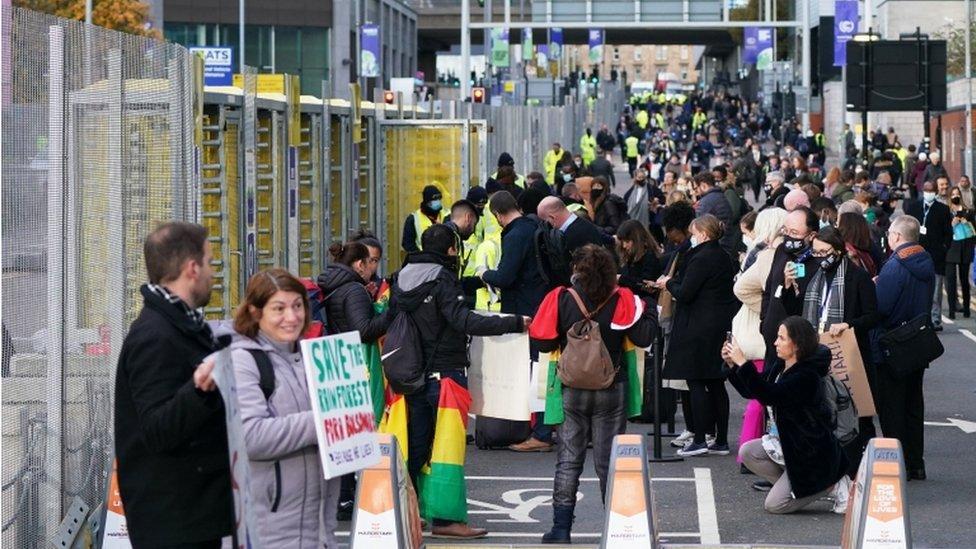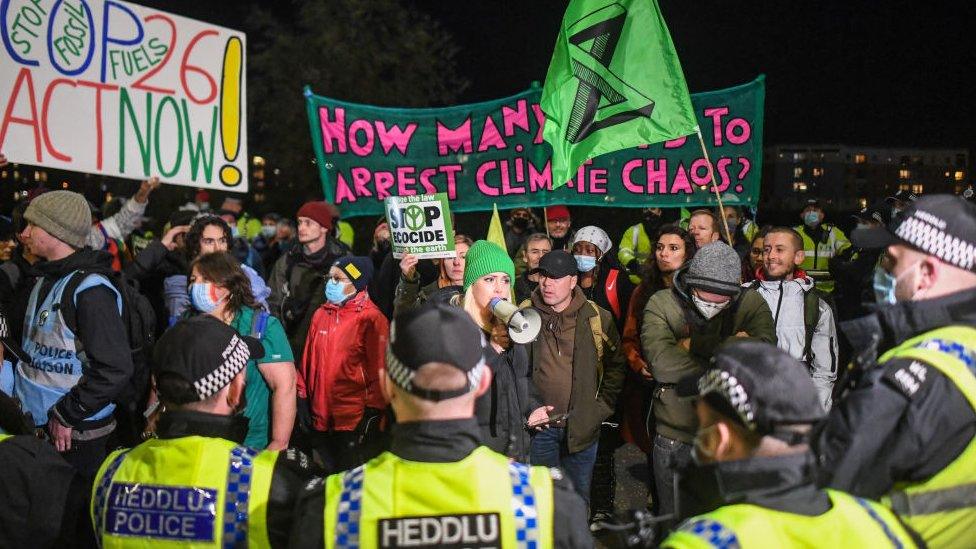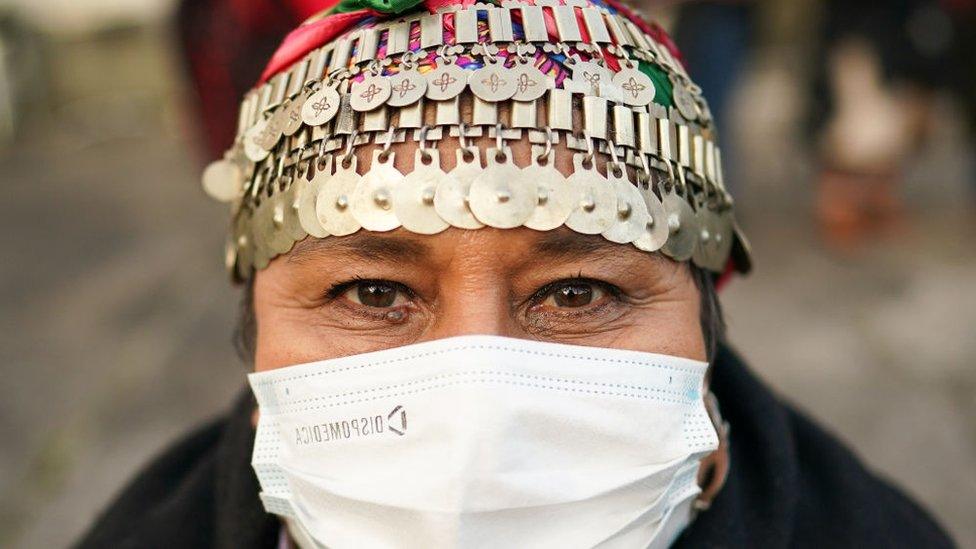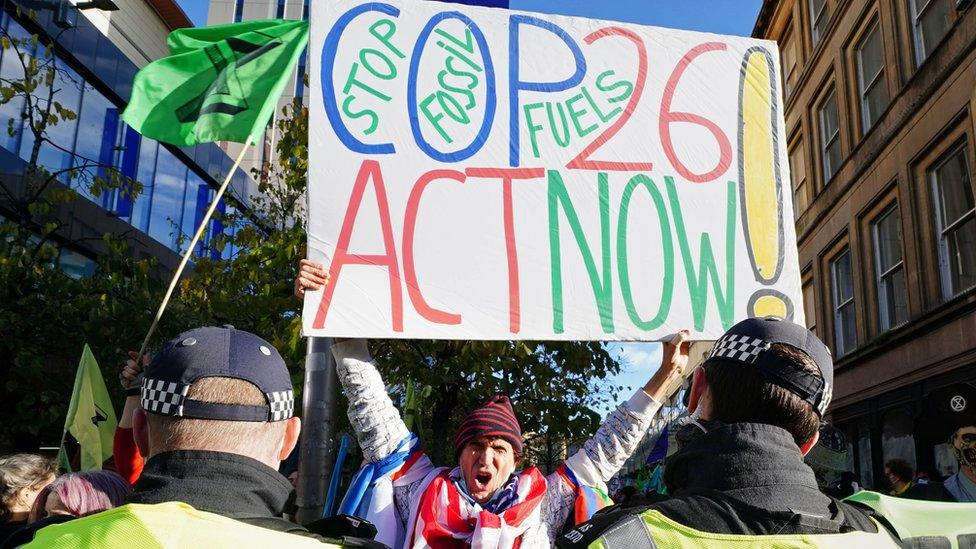COP26: Has the Glasgow climate summit been poorly organised?
- Published

Large queues have formed outside of the COP26 site all week
The COP26 climate summit in Glasgow has entered its fifth day - with the mood among many of those involved in the talks said to be positive about what has been achieved so far.
But away from the negotiating rooms, many grassroots delegates and activists have described the organisation of the event - which is being held in the midst of a global pandemic - as "shambolic".
What are the problems?
The most visible issue has been the huge queues that have formed outside the Scottish Events Campus as delegates attempt to get into the conference venue.
Thousands of delegates from across the world are attending the summit - but the vast majority of them have to use a single entrance to the site, which is officially UN territory for the duration of COP26.
When people do finally make it to the front of the queue they have to go through an accreditation process, including ID checks and proof of a negative Covid test, before they are allowed through the turnstiles into the restricted Blue Zone.
This led to people facing long waits in heavy rain and strong winds on Monday morning - with no protection from the elements being provided by organisers - with the scene being described as "utter chaos" by some of those who were there.
BBC News presenter Mishal Hussain said she was surrounded by delegates in the queue who were missing meetings, external that they were already due to be in.
Allow X content?
This article contains content provided by X. We ask for your permission before anything is loaded, as they may be using cookies and other technologies. You may want to read X’s cookie policy, external and privacy policy, external before accepting. To view this content choose ‘accept and continue’.
And videos appeared to show some people squabbling and pushing forward in an attempt to gain entry, with security stuff struggling to control them.
While the weather improved on Tuesday morning, the queue did not - with delegates again facing lengthy delays that caused some of them to miss meetings and other events.
But with world leaders including US president Joe Biden leaving Scotland on Tuesday evening, there were reports that the queue - while still long - was not as tightly packed and was moving quicker the following morning.
However, there were still reports of people attempting to jump the queue - and claims that security staff had started ordering delegates to stop taking photographs, external while waiting in line.
Public health expert Prof Devi Sridhar of Edinburgh University said the huge queues of people waiting to get in were "really concerning" amid the Covid pandemic, with case numbers in Scotland already showing early signs of increasing again.

A series of climate protests have been held across the city during the summit
The summit organisers sent messages to those participating in the event, urging them to access events remotely where possible because of the "high level of attendance at the venue".
They also warned that "entrance may be limited to certain categories of participants who must be fully present at the venue".
But some delegates have complained that the remote viewing system has been experiencing technical problems - and have questioned why they are only able to watch the summit online after paying huge sums of money on travel and accommodation costs.
What other issues have there been?
UK Prime Minister Boris Johnson - whose government is hosting the climate conference - apologised to an Israeli minister who said she was unable to access COP26 in her wheelchair on Monday morning.
Karine Elharrar - who has muscular dystrophy - said she was forced to return to her hotel 50 miles away on Monday after waiting outside for two hours.
Mr Johnson said he was sorry for the "confusion" - with Ms Elharrar saying she had managed to "easily" get into the conference the next day.
Israeli minister Karine Elharrar hopes for better wheelchair access at conferences
The UK's Environment Secretary, George Eustice, appeared to blame the Israeli delegation for the incident, telling BBC Radio 4's Today programme that they "hadn't made the right provisions at that particular entrance she was coming too".
Elsewhere, there have been complaints about Glasgow hotels charging a huge premium on their usual prices for the duration of the summit - with BBC Scotland finding one room that normally costs £42 a night being advertised at £1,400 a night.
This has led to concerns that delegates from poorer countries or smaller organisations have been priced out of coming.
And visa restrictions on entering the UK because of Covid meant many people from countries in the Global South - which will be worst affected by climate change - were unable to travel to the summit.

Some people from poorer countries have been unable to travel to Glasgow for the summit
The conference is also being held against the backdrop of a strike by refuse staff and street cleaners in Glasgow which has left many bins overflowing, and presumably is not giving international visitors the best impression of the city known to its residents as the Dear Green Place.
Road closures and protests across much of the city have also caused disruption - although there have been relatively few arrests made by police so far.
Are the problems unique to Glasgow?
Climate activist Vic Barrett of the Power Shift Network, who travelled to Scotland from New York for the conference, believes Glasgow has been the most disorganised of any of the COPs he has been to.
He said the combination of the difficulty and expense in getting to Glasgow in the first place - and the issues with actually getting into the venue faced by those who did make it - meant that "a lot of people were missing and a lot of voices were missing from the conversation" about climate justice.
BBC Scotland's environment correspondent Kevin Keane said the strict airport-style security checks for admission to the summit were standard at these events because of the presence of world leaders.
But he said the size of the queue and the long wait to gain entry in the hours before President Biden's arrival on Monday was unusual in his experience.
The BBC’s Science Editor David Shukman takes a look behind the scenes at COP26
Add Covid to the mix, with 25,000 delegates having to show their negative tests to security guards from their phones, and progress slows even further.
Kevin said the two previous COPs he has attended did run more smoothly, but they were pre-pandemic and their billing had been nothing like a high as Glasgow.
At the pre-COP in Milan, which started at the end of September, huge queues formed on day one as everyone had to take a physical Covid test to get in.
And the Mediterranean sun on the transparent roof of the entrance marquee saw temperatures inside soar to the point where it had to close in some areas.
At least that's something delegates will not have to worry about in Glasgow.
What have the organisers had to say?
The UN Climate Change Secretariat has apologised for the "inconveniences associated with accessing the venue of COP26, both physically and virtually".
But it emphasised that the summit was taking place under "exceptional and unprecedent" circumstances because of Covid, with access having to be reduced to some areas so social distancing could be maintained.
It said Covid safety rules also meant it had to reduce the number of security and registration lanes for people attempting to enter the venue.
The secretariat added: "At the same time, we have seen unprecedented interest in this conference, given the importance of addressing climate change, with high numbers of participants registering.
"The World Leaders Summit, with its inevitable security arrangements, had added to the many logistical pressures".


- Published3 November 2021
